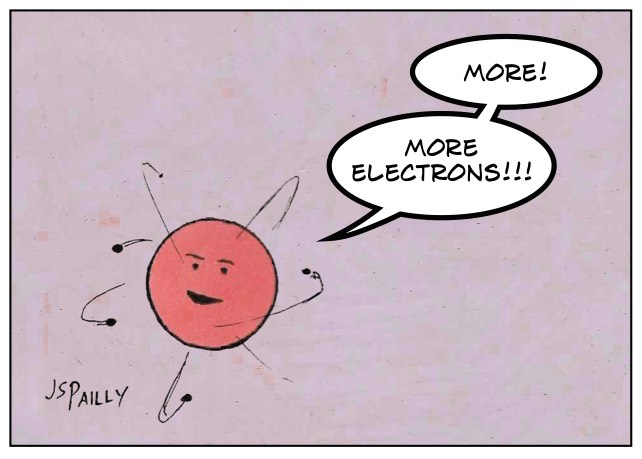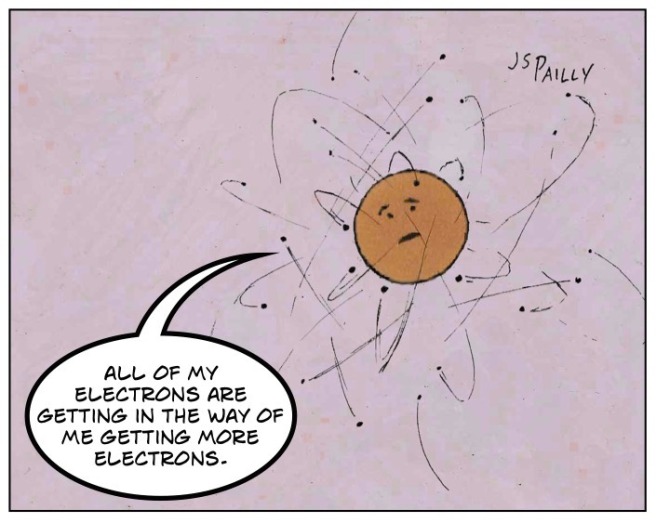Welcome to Molecular Mondays, a relatively new series here on Planet Pailly. Every other Monday, we examine the atoms and molecules that serve as the building blocks of our universe, both in reality and in science fiction. Today, we turn our attention to:
ELECTRONEGATIVITY
Ever since I started this Molecular Mondays series, I’ve wanted to identify chemicals that could serve as alternatives to oxygen in alien biochemistries. My research eventually led me to the concept of reduction potentials, which has now led me to the more fundamental concept of electronegativity.
When atoms join together as molecules, they share each other’s electrons, but they rarely share equally. Certain atoms (notably oxygen) tend to hog electrons. Electronegativity measures how much electron hogging an atom is wont to do.
When considering how electronegative an atom is, we should ask two key questions:
- How many protons are in the nucleus?
- How many layers of electrons surround that nucleus?
Since protons have a positive charge, an atom with more protons can exert a stronger attractive force on nearby negatively charged electrons.
But that attractive force is mitigated by the atom’s own electron shells. More shells mean less electronegativity.
Oxygen’s exceptionally high electronegativity means it’s very eager to participate in any chemical reaction that will give it more electrons, including the biochemical reactions that make multicellular life possible on Earth.
So what do aliens breathe if they don’t breathe oxygen? A quick look at the periodic table shows that several elements have electronegativities in a similar range to oxygen. So in terms of astrobiology, or at least in terms of writing science fiction, I believe two elements deserve special attention: fluorine and chlorine.


Interestingly, fluorine appears to be rare in the universe. It looks like it gets largely bypassed in stellar nucleosynthesis. And chlorine appears to be only created in supernovae. So, it looks like it would take an unusual concentration for life to evolve using one of them the way we use oxygen. Coming up with why that might be so could make for an interesting sci-fi setting.
BTW, love the images you use to spice up the posts! I’m curious what software you use to create them.
LikeLiked by 1 person
Scarcity is worth considering. Fluorine and chlorine breathers, if they exist, would probably be in the minority.
However, while oxygen is more common, it’s hard to find atmospheres of free molecular oxygen. Which means oxygen breathers like us might be almost as rare.
I recently stumbled upon an article on hydrogen breathing aliens. The article came from what I judged to be an unreliable source, but hydrogen is so common in the universe that the idea might be worth investigating.
As for the illustrations, they’re hand drawn (usually in colored pencil) with backgrounds (also colored pencil) photoshopped in. The speech bubbles are created with a program called Comic Life.
LikeLike
From what I understand, our biosphere largely created the high oxygen in our atmosphere as a waste product over billions of years in what is sometimes called the “Oxygen Catastrophe” because it initially was pretty hostile to life, until that life adapted.
Thanks for the info. I was afraid they might require artistic talent. They’re very well done. Have you ever considered doing a web comic? (Or are you already doing one somewhere else? 🙂 )
LikeLike
I did a post on the Oxygen Catastrophe a while back. There’d probably have to be a similar “Fluorine Catastrophe” before fluorine breathers could evolve, assuming a planet was seeded with enough fluorine to make that possible in the first place.
I’d like to do a webcomic, but at the moment, I think this blog is the closest I can get. Maybe some day, once a few of my other projects are out of the way.
LikeLiked by 1 person